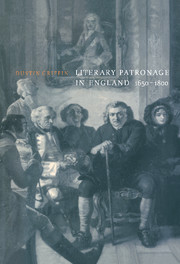Book contents
- Frontmatter
- Contents
- Acknowledgments
- 1 Introduction
- 2 The cultural economics of literary patronage
- 3 The politics of patronage
- 4 John Dryden
- 5 Jonathan Swift
- 6 Alexander Pope
- 7 Edward Young and Richard Savage
- 8 Mary Leapor and Charlotte Lennox
- 9 Samuel Johnson
- 10 The persistence of patronage
- 11 Conclusion
- Bibliography
- Index
10 - The persistence of patronage
Published online by Cambridge University Press: 22 August 2009
- Frontmatter
- Contents
- Acknowledgments
- 1 Introduction
- 2 The cultural economics of literary patronage
- 3 The politics of patronage
- 4 John Dryden
- 5 Jonathan Swift
- 6 Alexander Pope
- 7 Edward Young and Richard Savage
- 8 Mary Leapor and Charlotte Lennox
- 9 Samuel Johnson
- 10 The persistence of patronage
- 11 Conclusion
- Bibliography
- Index
Summary
It is a commonplace in studies of literary patronage to report that the patronage system sharply declined – or even died – sometime around 1755, when Johnson wrote his famous letter to Chesterfield. As early as 1832 Carlyle declared that
At the time of Johnson's appearance on the field, Literature … was in the very act of passing from the protection of Patrons into that of the Public; no longer to supply its necessities by laudatory Dedications to the Great, but by judicious Bargains with the Booksellers.
In Carlyle's theatrical imagination, Johnson's letter was “that farfamed Blast of Doom, proclaiming into the ear of Lord Chesterfield, and, through him, of the listening world, that patronage should be no more!”
Subsequent writers on the literary system of the eighteenth century typically repeated, in more moderate terms, Carlyle's thesis, not failing to see in Johnson's 1755 letter to Chesterfield the symbolic end of an era, but conceding that a new era had not yet dawned. Macaulay was insistent. He declared that when Johnson arrived in London “the age of patronage had passed away. The age of general curiosity and intelligence had not arrived … At the time Johnson commenced his literary career, a writer had little to hope from the patronage of powerful individuals. The patronage of the public did not yet furnish the means of comfortable subsistence.”
- Type
- Chapter
- Information
- Literary Patronage in England, 1650–1800 , pp. 246 - 285Publisher: Cambridge University PressPrint publication year: 1996



